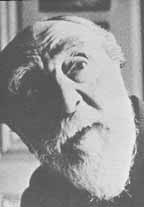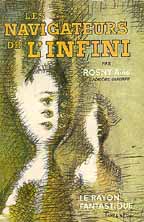Rosny, J. H. (the Elder, or Ainé) (1856–1940)
J. H. Rosny (the Elder) was the pseudonym of the Belgian writer Joseph-Henri Boëx who, like Flammarion, was encouraged by the evolutionary philosophy of Lamarck to pioneer the theme of genuinely alien life. In his first work, "Les xipéhuz" (The Shapes, 1887), he describes the arrival on Earth in prehistoric times of strange translucent beings which threaten the survival of the human race. Further bizarre life-forms appear in his "Un autre monde" (Another World, 1910) and La mort de la terre (The Death of the Earth, 1910).
 |
In 1925, Rosny coined the word "astronautique" in his description of a journey to Mars carried out in an attempt to restore peaceful relations between Earth and its neighbor. In his chronicle, entitled Les Navigateurs de l'Infini (The Navigators of Infinity) and Les Astronautes (The Astronauts), a human crew traveled to the Red Planet in the Stellarium, a spaceship powered by artificial gravity and made of "argine," an indestructible, transparent material.
The influence of Rosny's early work in France in the 1880s and 1890s has been cited as a factor in the decline of the popularity of Jules Verne's fiction in this same period. On Mars, the explorers came in contact with the gentle, peaceful, six-eyed, three-legged Tripedes, a dying race slowly being replaced by the Zoomorphs, alien entities made of minerals. A young Martian female, capable of bearing children parthenogetically by merely wishing it, gives birth to a child after falling in love with one of the human explorers – one of the first recorded romances between a human male and an alien female.
 |


